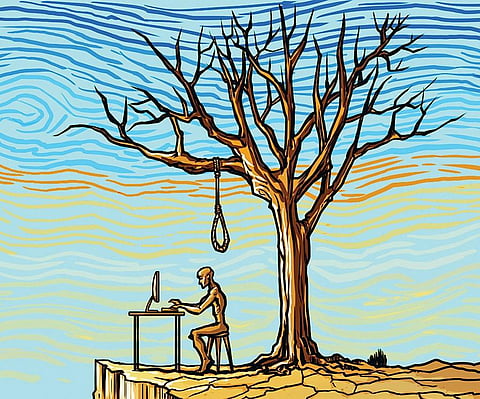

I was 12 when I first met my best friend at school. We shared the same seat for all my teenage years. Later, we went our ways—she keeping up her early, brilliant promise by studying medicine, while I dithered in search of a career. We kept in touch. She wrote short letters: clear and concise just as she was in her conversations; sent me cards on birthdays and new years. I responded, but never kept any of them.
At 22, having not heard from her for a while, I returned home to find out why. She’d been failed in one of her modules. After spending weeks with her parents and a day with mine, she’d sent her teenaged brother out on an errand, and left the world by hanging herself from a ceiling fan. Somehow, the pain of living had been larger than that of dying. Afterwards, I’d met her devastated mother, promising to keep in touch.
When I first heard of Sushant Singh Rajput’s death, I pictured my friend’s mother’s face.
Suicide might be a strictly private, lonely death, but it never kills just one person. For years, and even now, decades after her passing, I’ve wondered if the outcome would have been different if I’d been more available. Maybe there were clues in those letters. I should’ve taken her hostel phone number, called her long distance, been the best friend she thought I was. Hard to imagine the impact on her family.
I don’t know for sure why she took this step, just the same as Rajput’s alleged suicide. Weight of expectations, an inability to cope with failure, setbacks, a chemical imbalance in the brain? Years later, thinking of my friend, I’ve tried to hold my breath in swimming pools just to experience the explosive instinct of my animal body take the next breath. To subdue that will to live is no mean feat, and yet, children as young as six have been known to take their own lives.
When we lose someone to a disease, accident, crime, or calamity, the pain is no joke, but there’s a closure in knowing what or who was responsible. After suicides, we try to find someone to blame. Those committing suicide are called weak, too sensitive (look, others have faced much worse, and not killed themselves!). The bullies who drove them to suicide are called out (as they should be if they’re correctly identified). Families and friends blame themselves. After all, a person choosing to withdraw violently from life is an indictment of all of us.
In a lot of cases, mental illness is to blame. During these uncertain pandemic times, what can we do to support those beset by loneliness or adversity? Raising awareness of, and removing stigma from, mental illness is an important step. But suicide is an incredibly complex issue. Albert Camus called it the one truly serious philosophical problem. Easy answers like copy-pasted messages on social media—offering a listening ear—will not suffice, no matter how well-meant. Shaken by the death of a promising young movie star who’d risen from the masses by dint of his talent and perseverance, there’s been a collective need to offer each other reassurance—but that’s more about comforting ourselves than making a real impact.
Overwhelmed as we all are, it isn’t feasible to reach out to everyone, and in fact much worse to offer support and not come through. The increasing prevalence of suicide or self-harm shows up a lacuna in modern society. Despite the apparent bonhomie of social media, it actually aggravates loneliness, self-hate and isolation.
In all our personal interactions, we need balance. A deep willingness to give our time and support with generosity and sense of responsibility for another’s well-being, and an equal gratitude while accepting it. We need compassion. For others, and ourselves.My friend could have been a doctor today, a wife, a mother, the owner of a hospital, who knows what else. Instead, she’ll always be 22 even as I grow older and remember her soft, reticent smile. We can’t bring her or Sushant Rajput back, but we can be present in the lives of those we truly connect with. To tell them, You matter. Your voice matters. Nothing else is, or will ever be, as important.
Twitter: @damyantig Author and activist